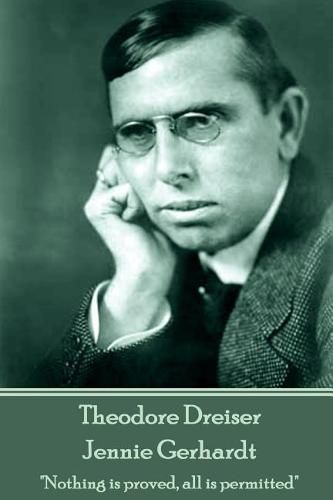Readings Newsletter
Become a Readings Member to make your shopping experience even easier.
Sign in or sign up for free!
You’re not far away from qualifying for FREE standard shipping within Australia
You’ve qualified for FREE standard shipping within Australia
The cart is loading…






Theodore Herman Albert Dreiser was born on August 27th, 1871 in Terre Haute, Indiana, the twelfth of thirteen children, and the ninth of the ten to survive, all of whom were raised as Catholics. Dresier had literary hopes and he was soon working as a journalist for the Chicago Globe newspaper and then moved to the St. Louis Globe-Democrat. He wrote several well-regarded articles on writers such as Nathaniel Hawthorne, William Dean Howells, Israel Zangwill, John Burroughs, and also interviewed many highly renowned public figures such as Andrew Carnegie, Marshall Field, Thomas Edison, and Theodore Thomas. After marrying Sara Osborne White in December 1898, the Dresiers stayed with Arthur Henry and his wife in Toledo, Ohio. There Dreiser began work on his first novel, Sister Carrie, published in 1900. It’s controversial themes perhaps explain why, at the time, it sold poorly. Since then, over the ensuing decades, it has become highly-regarded and been called the greatest of all American urban novels. Dreiser’s first commercial success was An American Tragedy, published in 1925. Its gestation had started way back in 1892, when Dreiser first began work as a newspaperman, he had begun to observe a certain type of crime in the United States that proved very common. It seemed to spring from the fact that almost every young person was possessed of an ingrown ambition to be somebody financially and socially.
Fortune hunting became a disease. Over the years Dresier had become more politically and socially active. Certainly, in matters of religion he had now become an atheist. He often engaged in fighting against censorship, especially as his books did not reflect the current social mores. Dreiser was a committed socialist and wrote several nonfiction books on political issues. These included Dreiser Looks at Russia (1928), the result of his 1927 trip to the Soviet Union. After the Second World War Dreiser joined the Communist Party USA in August 1945. Although less politically radical friends, such as H. L. Mencken, spoke of Dreiser’s relationship with communism as an unimportant detail in his life, these seems at variance with his actual activities. Theodore Herman Albert Dreiser died on December 28, 1945, in Hollywood, California, of heart failure, at the age of 74.
$9.00 standard shipping within Australia
FREE standard shipping within Australia for orders over $100.00
Express & International shipping calculated at checkout
Theodore Herman Albert Dreiser was born on August 27th, 1871 in Terre Haute, Indiana, the twelfth of thirteen children, and the ninth of the ten to survive, all of whom were raised as Catholics. Dresier had literary hopes and he was soon working as a journalist for the Chicago Globe newspaper and then moved to the St. Louis Globe-Democrat. He wrote several well-regarded articles on writers such as Nathaniel Hawthorne, William Dean Howells, Israel Zangwill, John Burroughs, and also interviewed many highly renowned public figures such as Andrew Carnegie, Marshall Field, Thomas Edison, and Theodore Thomas. After marrying Sara Osborne White in December 1898, the Dresiers stayed with Arthur Henry and his wife in Toledo, Ohio. There Dreiser began work on his first novel, Sister Carrie, published in 1900. It’s controversial themes perhaps explain why, at the time, it sold poorly. Since then, over the ensuing decades, it has become highly-regarded and been called the greatest of all American urban novels. Dreiser’s first commercial success was An American Tragedy, published in 1925. Its gestation had started way back in 1892, when Dreiser first began work as a newspaperman, he had begun to observe a certain type of crime in the United States that proved very common. It seemed to spring from the fact that almost every young person was possessed of an ingrown ambition to be somebody financially and socially.
Fortune hunting became a disease. Over the years Dresier had become more politically and socially active. Certainly, in matters of religion he had now become an atheist. He often engaged in fighting against censorship, especially as his books did not reflect the current social mores. Dreiser was a committed socialist and wrote several nonfiction books on political issues. These included Dreiser Looks at Russia (1928), the result of his 1927 trip to the Soviet Union. After the Second World War Dreiser joined the Communist Party USA in August 1945. Although less politically radical friends, such as H. L. Mencken, spoke of Dreiser’s relationship with communism as an unimportant detail in his life, these seems at variance with his actual activities. Theodore Herman Albert Dreiser died on December 28, 1945, in Hollywood, California, of heart failure, at the age of 74.